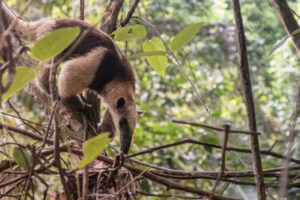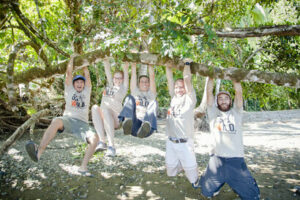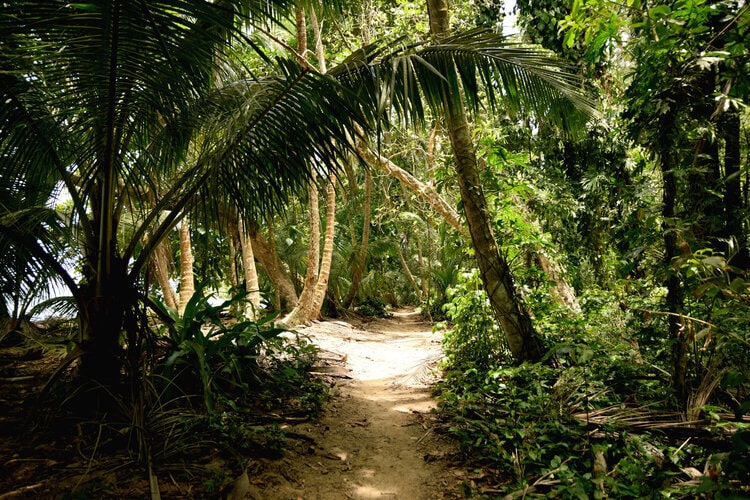Ifigenia Garita is a tropical biologist, conservationist, and naturalist guide from Costa Rica. She’s the founder of Osa Wild, a tour operator that supports the local community through tourism. Apart from organizing tours, she volunteers for Escuna, a non-profit organization that helps youngsters develop. Ifigenia strongly believes it’s important to help people in the first place, and that by offering them opportunities, they will realize how beautiful nature is and that it needs to be preserved. We asked her a few questions about the tours she’s organizing and the impact of overtourism in Costa Rica.
Why did you decide to study tropical biology?
Since I was a kid, I’ve always felt best in nature, but I was also inspired by my mom, who was also a tropical biologist and specialized in entomology. Thanks to her and what she has taught me, I became a person that’s connected to both humans and nature. My mom was also the president of the NGO that I run now, so I have really been following in her footsteps.
Is overtourism something you’re worried about?
Yes, that’s something I’m very afraid of, overtourism is a big problem in certain areas of Costa Rica. I have also seen the benefits of tourism, though; it distributes money to so many people – from drivers and guides to hotel and restaurant owners! Sadly, I see how places have changed because of tourism too. For example, swamps, where there used to be lots of birds, were drained to build hotels.
How can we combat overtourism?
Visiting places that are less touristy helps, but unfortunately, it doesn’t solve the problem. I think the government of Costa Rica needs a policy that keeps the development of an area limited. What we can do is try to empower and educate local people so that they have more opportunities. Some of the best things you can do is to visit locally-owned restaurants and hotels, stay at homestays, and book tours through operators that are based on community-based tourism. This way, your money will benefit local people instead of big foreign hotel chains, for example.
Can you tell us something about Costa Rica and the Osa Peninsula?
Costa Rica is a very special place. Since 1949, the country doesn’t have an army anymore, and most of the projects that continue from the abolishment of the army are related to educational programs. That’s something I really admire about this country!
The place where I work as a guide is called the Osa Peninsula. It’s located close to Panama, in the Southwest of Costa Rica, and National Geographic named it the second most biodiverse place on the planet (right after the Amazon). One-third of the Osa Peninsula is covered by the Corcovado National Park, which was created in 1975 after a group of biologists convinced the government that this area should be protected. It was the last remaining humid rainforest on the Pacific Slope of Central America, and at the time, our neighboring countries were cutting it down for cattle and agriculture. Thanks to these biologists, though, that’s something that didn’t happen in Costa Rica. You can see tapirs, macaws, whales, monkeys, dolphins, turtles, etc. in Corcovado National Park, and there’s also a wide variety of endemic species of birds, reptiles, and amphibians here.

What type of tours do you organize?
Osa Wild offers tours that connect people with nature and promotes ecotourism. The tours we offer contribute directly to the local economy, and they ensure the wellbeing of the environment as well. The Intense Jungle Trek, for example, is our most popular tour, and you will stay in a place owned by an ex-poacher on this trek. Thanks to people’s efforts, this man got to see how people love nature, and because of this, he and his community have changed completely!
What is your number 1 tip to all of us to travel more sustainably?
Try to be a researcher before traveling. Make sure you have the right information and be conscious about where your money goes to. Support local businesses and buy from local people – the best way to make people thrive and succeed is by supporting their projects, especially after such a bad time for tourism.
Can you tell us what not to do when we’re visiting the jungle?
Don’t invade the animals’ space and be quiet. It’s also important not to bring anything home from the jungle. I see people who collect stones or sand, for example, but those things are needed in the jungle, so it’s important to leave them where they are.





0 Comments